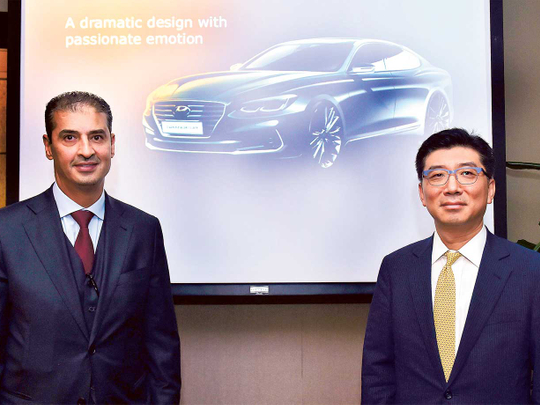
Dubai: South Korean automotive giant Hyundai has a lot riding on the Middle East markets — this is one of four global territories where it expects to leverage the most out of its newly rolled out Genesis luxury nameplate. Get it right in markets such as the UAE and Saudi Arabia and Genesis has every chance of being talked about with the same reverence as a BMW or a Mercedes.
Apart from this region, the Genesis game plan is to break through in the US and China as well as in its home market.
It was late last year that Hyundai decided it was time to spin off its luxury skewing models into a separate stand-alone brand, much along the lines of how Lexus and Infiniti went about doing it. US high-end badges Lincoln and Cadillac are also doing the same now, and joining these exalted ranks soon will be China’s Great Wall Motors (with the “Wey” brand) and Geely (via Lynk).
The first — and vital — piece of the Hyundai strategy is already in place, taking the form of the flagship G90, the model that will go head-to-head with the 7-Series and the S-Class. In the UAE, the G90 starts at Dh299,000.
“The initial response has gone beyond our expectations — the original estimate was for 12,000 units in our home market of Korea,” said Zayong Koo, Hyundai’s Vice-President for Global Corporate Communications and Investor relations. “It’s actually running at twice as much.
“In the US and the Middle East, shipments were affected — unfortunately — because of labour problems at the plants in Korea. That, however, is being normalised.”
At the local level, the Genesis aspirations could be supported by a stand-alone showroom, confirmed a top official with the dealership, Juma Al Majid Motors. “We are finalising something that will be in tune with the global design philosophy of how a Genesis facility should look like,” said Khalid Eisa, Chief Operating Officer. “We should decide by June next and for the location, it would be next to the existing flagship Hyundai one in Deira.” (The first of the “Genesis Studio” outlets opened in Seoul last September.) According to Eisa, consumer sentiments in the automotive industry remains extremely fraught. “After five years of exceptional growth, the market and consumers are readjusting,” he added. “Overall (new car) sales volumes are down 20 per cent over 2015.”
Traditionally, Hyundai sales in the region have averaged “half-a-million” units and, despite the market conditions, the carmaker said it remains hopeful of closing somewhere near the mark. Saudi Arabia is the biggest market for it and followed by the UAE. Officials said it was too early to talk about the likely numbers for Genesis.
“We will start having the full-year benefits from the G90 availability in 2017 — between now and 2020, there will be six broad models under the Genesis brand, including two SUVs and a sports coupe,” said Koo. On whether the SUV launches could be brought forward — given how such models fare in priority markets such as the Middle East and the US — he said: “I don’t think there is a possibility of such a change.”
According to industry sources, demand for luxury vehicles in the UAE have done reasonably well compared with the wider market. The year-on-year decline is said to be in the range of 7-12 per cent, which, sources say, represent some sort of silver lining. Moreover, fourth quarter demand has, in fact, seen a slight spike and especially for the high-end SUV models, again good tidings for an industry that hasn’t had too many of them this year.












